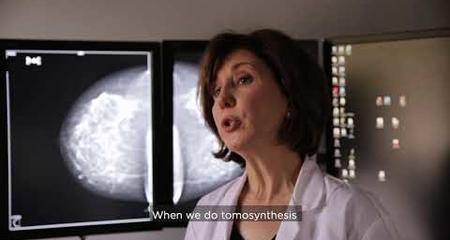More than 268,600 women and just over 2,600 men will be diagnosed with invasive breast cancer in the U.S. In Wisconsin, it is estimated that 5,270 new cases (female) will be identified. Breast cancer is the second most common cancer among American women, following skin cancer (Source: American Cancer Society, 2019).
Early Breast Cancer Detection Saves Lives
Early detection – monthly breast self-exams, combined with regularly scheduled mammograms, and an exam by your provider at least once each year – can dramatically increase your chances of surviving breast cancer. If diagnosed, getting a breast cancer second opinion can also ensure your diagnosis is accurate and you are aware of all the treatment options available. Learn more about our Cancer Second Opinion Program.
Caring for the Individual Woman
No two women are alike. In the Breast Cancer Program, the care experience is built around you. After a breast cancer diagnosis, our physician specialists work as a team to provide each patient with a comprehensive treatment plan. And our new patient coordinator makes sure you get all the appointments, tests, services and support you need.
Our breast cancer treatment includes innovative clinical trials, surgeries, advanced approaches to radiation treatment, expertise in the latest drug therapies and sophisticated breast reconstruction procedures. You benefit from completely coordinated treatment and a seamless care experience within the Froedtert & MCW Cancer Network.
Risk Factors
The risk of developing breast cancer increases with age. Women concerned about their risk of developing breast cancer can receive a thorough risk evaluation and a customized breast health plan.
- Women with a family history of breast cancer (especially cases at a younger age) have an increased personal risk of breast cancer.
- Women who have had a previous case of breast cancer have an increased risk of developing a second, unrelated breast malignancy.
- Some women have an increased genetic risk of breast cancer (see Genetic Testing for BRCA Genes).
- Other risk factors include physical inactivity, being overweight (especially post-menopause), regular alcohol consumption, early menstruation, late menopause, recent use of oral contraceptives, use of hormone replacement therapy consisting of estrogen and progesterone, never having children, and giving birth to one’s first child after the age of 30.
Breast Cancer Video FAQ
Watch a series of videos addressing questions about breast cancer and treatment.
Complete Services for All of Your Needs
Services include screening, diagnosis, treatment, nutritional counseling and more. Women also have access to our Breast Cancer Cognitive Evaluation Services, which specialize in helping cancer patients cope with cognitive, behavioral and emotional changes that may be caused by their disease and/or treatment.
Full Team of Breast Cancer Specialists
Our team of physician specialists includes surgical oncologists, medical oncologists, radiation oncologists, breast imaging specialists, pathologists and plastic surgeons. The program also includes breast cancer nurse practitioners —clinical nurse specialists who focus on the needs of women with breast cancer, board certified genetic counselors, and registered dietitians and social workers who specialize in helping cancer patients.
Because of their dedication to scientific research, our physicians are able to offer patients the very latest advances in breast cancer treatment. Their active involvement in national clinical trials gives many women access to promising investigational therapies.
Mammograms and the COVID-19 Vaccine – What You Should Know
Swelling of the lymph nodes is a known side effect of the COVID-19 vaccine as well as other vaccines. Although it is temporary and not harmful, these enlarged lymph nodes may be seen on your mammogram. Because swollen lymph nodes can indicate breast cancer, we may call you back for additional evaluation and possible follow-up imaging.
Virtual Visits Are Available
Safe and convenient virtual visits by video let you get the care you need via a mobile device, tablet or computer wherever you are. We’ll gather your medical records for you and get our experts’ input so we can offer treatment options without an in-person visit. To schedule a virtual visit, call 1-866-680-0505.
More to Explore






